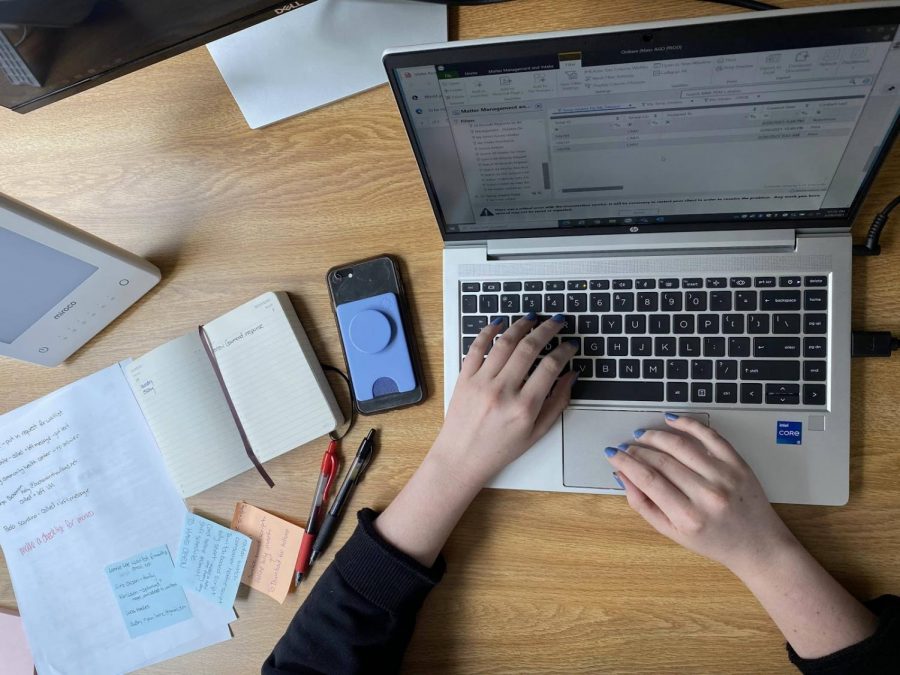Northeastern students respond to working during spring semester
Due to the pandemic, many students are struggling to find a co-op.
April 9, 2021
Working students in the Northeastern community have struggled to adapt to the adverse effects of the COVID-19 pandemic. For students balancing both work and school, these difficulties have recently been exacerbated by midterms and a lack of spring break.
Mikaela Black, a second-year international affairs and economics major co-oping at the Massachusetts Attorney General’s Office in the Consumer Advocacy and Response division, said she’s had difficulties adjusting to a nine-to-five full-time job from her room.
“Comparing doing classes and being on co-op, I think it’s even worse being on co-op because I’m required to be at my desk the entire time from nine-to-five,” said Black. She added that her work requires her to be constantly accessible, so she is typically unable to move around and take breaks throughout the day.
Co-op students typically don’t take classes, however, students can choose to take one or two courses in the semester. When asked why she decided to take only one course during her co-op, Black said that more than one would be too much work.
“Co-op is a big-time commitment, it’s almost 40 hours a week,” she said. “When I first started co-op, I was so excited because I thought I’d have more free time without homework. Though I have the evening off, I am so exhausted at the end of my workday.”
Despite these challenges, Black said she is learning to adapt; “It’s a lot busier than I thought,” she said. “But it’s definitely manageable.”
Last fall, many students struggled to find co-ops and work because of the COVID-19 pandemic.
“There weren’t as many job postings, some jobs were hiring but not paying and many employers were not hiring at all,” Black said.
In the spring semester, however, some things have begun to return to normalcy. Students are returning to work and job openings are resurfacing.
Now, students are taking on co-ops and working both off-campus and on-campus jobs despite the challenges, limitations and inconveniences that have come as a result of the pandemic.
Shanvi Patel, a fourth-year regulatory affairs master’s student, said the work-school balance has been easier for her this semester than last.
“Everything is pretty much aligned … It’s not too much of a hassle, nothing is conflicting,.” said Patel, who works as a front desk operations coordinator at the Curry Student Center.
Patel is in a different situation from Black though, as Black is involved in a co-op and Patel is a master’s student working on campus. Along with working part-time at the front desk, Patel is also completing a capstone project with China Medical Device, a company that “provides the regulatory, CRO (contract research organization), and market intelligence to help companies access China’s fast-growing $80-billion MedTech market,” according to their website. Patel works 12 to 16 hours a week while completing a capstone project that she describes as a “hybrid course” because she “takes a class and works simultaneously.”
Despite everything that she has going on, Patel finds the work-school balance easier now than in the fall.
“Last semester, when I took classes full time, there was more conflict between work and academics because I had to take classes virtually.”
Bashir Sahrour, a first-year mechanical engineering major, feels similarly to Patel. While discussing the challenges of shifting mindsets from academics to work, Sahrour addressed an unanticipated consequence of taking online classes and going to work.
Since September, Sahrour has been involved in a work study. He helps make parts for senior mechanical industrial engineering majors doing their capstone projects.
“There are days when I go straight from work to class which can be disruptive to my mindset…sometimes I go from work to a lab…so I don’t get a break from the start to the end of the day.”
Working students across the Northeastern community have expressed concern surrounding how the COVID-19 pandemic has affected co-ops and on-campus jobs. Though each student has a different experience with the work-school balance, working students have a whole host of new challenges to consider as the pandemic continues.
Though each student has a different experience with the work-school balance, understanding these perspectives emphasizes that new challenges will come when looking for and applying for jobs now and in the future.








